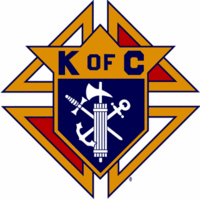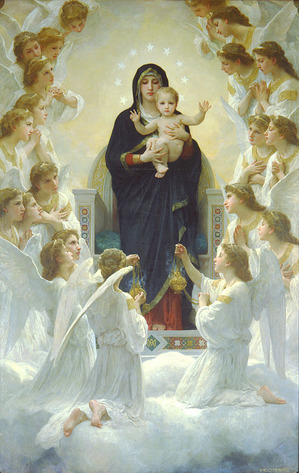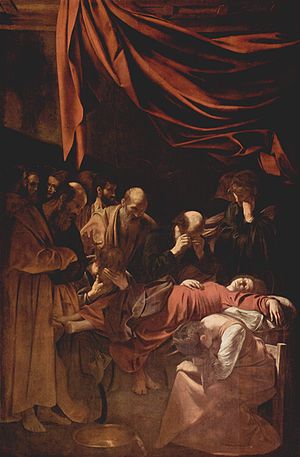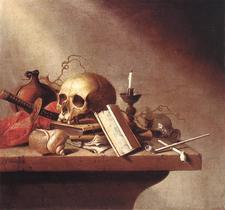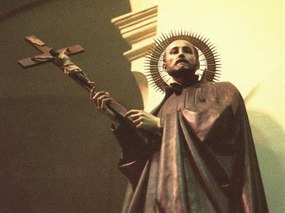Here is the post-communion address of the newly ordained Bishop David O’Connell CM, coadjutor of Trenton, as prepared for delivery (the text does not include the ad lib remarks):
 I have been thinking a great deal in recent months about the role and ministry of bishops in the Church. You might think, sitting here in the Cathedral today in the midst of this beautifully moving ceremony, you had good reason for such reflection! And, while there is real truth to that reaction — at least since the Apostolic Nuncio first met with me on May 24 about coming to Trenton — I did have some other motivations. For the past twelve years, I was president of The Catholic University of America in Washington, D.C, a place that is known as the “bishops’ university.” I am grateful that so many of my colleagues and friends from Catholic University are here with us today, both in the pews and around the sanctuary. Throughout those twelve years, I had many occasions to get to know bishops from around the country either as university trustees or as visitors to campus. We spoke about many things: their dioceses, their experiences, their joys and their challenges. I came to admire them as good men, good priests and good leaders. Although they all differed from one another in many ways, they all had one thing in common: they loved their people.
I have been thinking a great deal in recent months about the role and ministry of bishops in the Church. You might think, sitting here in the Cathedral today in the midst of this beautifully moving ceremony, you had good reason for such reflection! And, while there is real truth to that reaction — at least since the Apostolic Nuncio first met with me on May 24 about coming to Trenton — I did have some other motivations. For the past twelve years, I was president of The Catholic University of America in Washington, D.C, a place that is known as the “bishops’ university.” I am grateful that so many of my colleagues and friends from Catholic University are here with us today, both in the pews and around the sanctuary. Throughout those twelve years, I had many occasions to get to know bishops from around the country either as university trustees or as visitors to campus. We spoke about many things: their dioceses, their experiences, their joys and their challenges. I came to admire them as good men, good priests and good leaders. Although they all differed from one another in many ways, they all had one thing in common: they loved their people.
Today, through the grace and mercy of God and the sacrament of ordination, I join their ranks as successors to the Apostles. Like them, I approached this day filled with joy and gratitude but also with a sense of humility and awe. Like them, I am profoundly aware of my flaws and limitations, that I am far from perfect. Like them, I do not know what the future will hold but I am quite sure that the expectations are as many and as different as there are people in and outside of this Cathedral.
When the Apostolic Nuncio spoke with me that morning in late May, he shared much information about the Diocese of Trenton and the process involved in my appointment. But he said something to me that I will never forget: “Father, always remember that there are over 830,000 souls in your Diocese. And you will be responsible for all of them.” What has been very much on my mind since that conversation is simply this: how will I exercise that responsibility?
The other day, someone asked me how long it took to come up with my Episcopal motto, Ministrare non Ministrari — “to serve and not to be served” — to which I responded, “about two seconds.” When I was first ordained a Vincentian priest — and I am so happy to see so many of my confreres here — the Gospel reading for the ordination Mass contained those words of Jesus Christ in Mark’s Gospel. I was struck with the phrase then as being a perfect description of how to follow the Lord as a priest: “to serve and not to be served and to give my life as a ransom for the many.” This was how I wanted to live out my life as a priest. This is how I want to live out my life as a bishop and how I hope to exercise that responsibility.
According to the Second Vatican Council, “Christ gave the apostles and their successors the mandate and the power to teach all nations and to sanctify and shepherd their people in truth (Christus Dominus, 12).” To teach. To sanctify. To shepherd their people in truth. Christ gave this mandate to the successors to the Apostles. Christ gave this power. And with power like this comes great responsibility. Please pray for me.
“To serve and not to be served.” In my letter to our Holy Father Pope Benedict XVI accepting his appointment, I wrote to him of my choice of a motto. In his response to me read here today, he repeated them.
A bishop serves his people by teaching truth. The truth that comes through the Gospel, the truth that comes through the Church and all its teachings, the truth that lives among us a community of faith, for “where two or three are gathered in my name, there am I in the midst of them (Matthew 18: 20).” This is how a bishop serves, not by being served through compromise or taking the easy way out, not by being served saying only what people want to hear or what makes them comfortable, striving to be popular. As Pope John Paul II wrote, the truth that we teach “has its origin in God himself … (but) people can even run from the truth because they are afraid of its demands (Fides et ratio, 7; 28).” Christians cannot run from the truth for this reason. Nor can the bishop. This is how he serves.
A bishop also serves by sanctifying his people and by leading them to holiness. And there is only one way to holiness: Jesus Christ and a personal relationship with him, convinced in faith as we must be that he alone is “the way, the truth and the life (John 14: 6).” All three make us holy. Jesus Christ is the Risen Lord. He triumphed over death and every suffering and evil. The bishop is called, it is said, to be a servant of the empty tomb not of the status quo. He leads his people to holiness by bearing witness to what the empty tomb means: joy, hope, the promise of new life, remembering Jesus’ own words: “In the world you will have troubles but take courage: I have overcome the world (John 16:33).” This is how the bishop serves.
Finally, a bishop serves by leading, by guiding, by shepherding his people. This is, perhaps, the most difficult not only for those he governs as bishop but for the bishop himself, marked as he is by human weakness. But lead he must, by word and example. God gives the grace. And follow we must. God gives the grace. The answers that we may seek from him, the answers that we may want from him may sometimes not be what we seek or want. Sometimes the answer is no. “The gate is narrow and the road is long that leads to life (Matthew 7: 14).” This is how the bishop serves and this is where that service leads: to life.
To serve and not to be served. To teach. To sanctify. To shepherd. This is what a bishop does for God’s people and with God’s people: brother bishops, fellow priests, deacons, faithful religious women and men and all the baptized, one community of faith. With a grateful heart I thank you for being here today, too many to call by name. Please know that I care deeply for you all. With humble, faithful hearts, let us go forward, together, “to serve and not to be served.”
